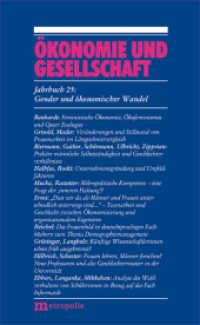Full Description
In recent years, the Belt and Road Initiative (BRI) has not only transformed global trade relations but also tested Germany's political strategies. This book explores the German Federal Government's ambivalent response to China's politics of infrastructure investments under the BRI during Angela Merkel's tenure as Chancellor, raising crucial questions about Germany's bilateral relations with China, its economic ambition, and its geopolitical responsibility.
This book provides a detailed account of the key political processes and decision points that influenced the Federal Government's stance towards China's politics of infrastructure investments. Through its analysis of the interactions between domestic politics and international relations, it aims to offer a nuanced understanding of the complex dynamics between the state and business. It examines how the varying interests of numerous industry sectors impacted the Federal Government's response to China's politics of infrastructure investments across multiple policy domains, covering Germany's policy on foreign investments and foreign trade, its industrial policy, its broader foreign policy, and its role in European politics.
Contents
Introduction and research question.- The two-level-game approach as an analytical framework.- The two-level game approach in contested territory.-Aggregate perceptions and levels of participation.- Qualitative case studies.- A leap of faith: Germany's response (2013-2015).- The logic of compartmentalization: Germany's response (2016-2018).- The unsolved dilemma: Germany's response (2019-2021).








